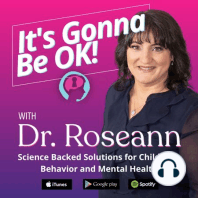35 min listen

65: How to Stop Feeding the OCD Monster
FromScience Backed Solutions for Children’s Behavior and Mental Health
65: How to Stop Feeding the OCD Monster
FromScience Backed Solutions for Children’s Behavior and Mental Health
ratings:
Length:
18 minutes
Released:
May 17, 2023
Format:
Podcast episode
Description
Most people confuse obsessive compulsive disorder (OCD) with other mental health disorders particularly, anxiety disorder. It’s important for us to learn more about how to identify these OCD symptoms as these recurring obsessions and repetitive behaviors can interfere with a person’s daily life. We’ll be talking about another important topic in today’s episode – how to stop feeding the OCD monster. This is going to be a fruitful episode as OCD treatment is not similar to that of anxiety. What is obsessive compulsive disorder (OCD)?OCD is all about fear. It is a behavioral manifestation of all these intrusive thoughts and behaviors that are completely irrational and most of the time, they don’t make any sense. Its core features are obsessions, or compulsions and rituals. Such obsessions, compulsions and rituals can severely affect one’s life especially in terms of daily living and relationships. They make it difficult for someone to focus on or finish things effectively, and they usually take up a significant amount of time. Additionally, it may interfere with social interactions or relationships, making other people irritated or impatient.Commonly, most people associate OCD with anxiety or worry. But in fact, it’s really more like a fear-driven behavior. When you’re dealing with OCD, you tend to try to prevent something bad from happening.How does OCD show up in the world?It is not only the adults who experience OCD. Even young children are diagnosed with it. There are many ways that OCD sort of shows up in the world and often, people just shrug these instances off, making it harder for us to treat OCD.I think another factor that contributes to the difficulty in treating OCD is that it’s usually confused with anxiety. There are providers who claim that they treat OCD when in fact they don’t and are simply using anxiety treatment instead of a specialized treatment for OCD.The specialized treatment we’re referring to is the exposure and response prevention. That’s why it’s important to have a highly skilled provider who conducts cognitive behavioral therapy with exposure therapy. Personally, that’s what we use in our clinic because we’ve seen how effective it is in dismantling behaviors. We all know how much of a tyrant OCD is. It just takes over everything and it can really hijack a life. That’s why I’ve had many encounters with families crying because of the positive development of their children particularly when they learn how to take control and stop accommodating OCD through behavioral therapy combined with other treatments like exposure and response prevention.What does “accommodation” mean?Accommodating means we are fueling the OCD and the behaviors that come with it. For example, your child constantly asks questions to reassure himself, and you answer his question every single time. Every time you answer, you actually reinforce the fear or other irrational and intrusive thoughts. When we accommodate the questions by answering them, we’re lowering the fear response rate. But then every time we answer the question, we actually move the baseline up. This is how we get behaviorally habituated and this is how the brain forms a habit. So when we reinforce this, we actually increase the likelihood of OCD behaviors.What we have to do now to stop accommodation is to stop answering them every single time. I know it’s quite difficult to do that but we have to really set boundaries if we want to stop feeding the OCD monster.Getting your partner and caregivers on the same page is the biggest obstacle.I think one of the biggest obstacles in this journey is getting your partner and caregivers on the same page. In ERP treatment, 30% of people drop out because parents have a hard time doing the work either on their...
Released:
May 17, 2023
Format:
Podcast episode
Titles in the series (100)
20: Fasting for Anxiety and Depression by Science Backed Solutions for Children’s Behavior and Mental Health